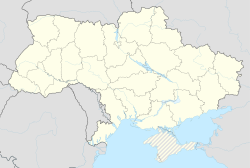Balta, Odessa Oblast
|
Balta Балта |
|||
|---|---|---|---|
| City of regional significance | |||

The city view
|
|||
|
|||
| Coordinates: 47°56′24″N 29°37′19″E / 47.94000°N 29.62194°ECoordinates: 47°56′24″N 29°37′19″E / 47.94000°N 29.62194°E | |||
| Country |
|
||
| Region |
|
||
| District | Balta Raion | ||
| Founded | 1797 | ||
| Government | |||
| • City Head | Serhiy Mazur | ||
| Area | |||
| • Total | 22.97 km2 (8.87 sq mi) | ||
| Elevation | 23 m (75 ft) | ||
| Population (2015) | |||
| • Total |
|
||
| Time zone | EET (UTC+2) | ||
| • Summer (DST) | EEST (UTC+3) | ||
| Postal code | 66100—66105 | ||
| Area code | +380 4866 | ||
| Website | [1] | ||
Balta (Ukrainian: Балта; Romanian: Balta) is a city in Odessa Oblast in south-western Ukraine. It is the administrative center of the Balta Raion (district), as well as a city of regional significance. Population: 18,993 (2015 est.) The city's population was 19,772 as of the 2001 Ukrainian Census.
Balta was first founded in 1797 out of a combination of three nearby towns; Yuzefhrad (Юзефград, Polish: Józefgród; until 1793 part of Poland), Yelensk (Еленськ), and Balta (Балта; until 1792 part of the Ottoman Empire). It is located in the historic Podolia region of Ukraine. According to the Russian census of 1897, with a population of 23,363 it was the fourth largest city of Podolia after Kamianets-Podilskyi, Uman and Vinnytsia. In 1900, the city's Jewish population numbered 13,235.
From 1924-1929, the city was the capital of the Moldavian Autonomous Soviet Socialist Republic. With the annexation of Bessarabia in 1940, Balta became a part of the Odessa Oblast of the Ukrainian Soviet Socialist Republic. It was occupied by German and Romanian troops in 5 August 1941 and was became part of Transnistria Governorate in Kingdom of Romania till its liberation in 29 March 1944 by Red Army.
...
Wikipedia




